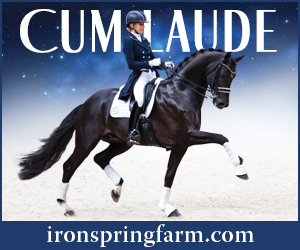By Emma Kane
Welcome to our new series, “Clear Eyes, Sound Mind, Halt, Salute.” Focusing on equestrian mental health, these articles come from dressage riders across the country who wish to share their struggles and triumphs. With so much focus on the physical health and fitness of riders, it is important not to neglect the mental health aspect of becoming a great equestrian. We hope these stories and bits of advice show you that you’re not alone and inspire you to push on through all challenges.
___________________________
Dressage is hard. However, most of us do this for fun. Just because it is supposed to be fun does not stop many riders from struggling with fear and anxiety related to showing.
You have spent weeks planning for the show, and have put years of work and money into your riding and your horse’s training. You have carefully budgeted to make sure that you are able to show. All paperwork was completed and turned in on time. You’re a bit anxious about the show, but are excited at the same time. When arriving at the show for schooling day, you spent hours setting up your stall, preparing your horse, and you have a great school in the show ring.
Everything seems to be coming together. You wake up at the crack of dawn, grab coffee on your way to the show grounds, and take care of your horse all while running through your tests in your head, imagining a flawless test. The time comes to warm up, and both you and your horse look perfect. While heading to the warm up arena, you start to get nervous. Thoughts of what could go wrong as well as what you have sacrificed to be here start to pop into your brain. By the time you get to the warm up arena, the anxiety is spiraling. Little things that typically do not bother you or you are usually able to fix, like a small spook or your horse being a bit strong, are now the end of the world. For the life of you, you cannot figure out why this is so hard. You hear your number called and head to the ring. Instead of letting the anxiety spiral continue, here are five things to help get your mental game back before heading down centerline.

1. Ask yourself what is the worst that could happen?
Once you have thought about all of the terrible things that could happen in the ring, think of what is the best that could happen. You could have that perfect test you were dreaming of earlier! But, for you and your horse, realistically, what is most likely going to happen? This is usually somewhere between the worst and best case and can help you reality check your feelings entering the ring.
2. Notice how you are feeling, truly notice.
Are you nervous? Anxious? Excited? Happy? Sad? Afraid? Frustrated? Jealous? Comfortable? Focused? Properly name the emotion you are feeling.
3. Ask yourself why you are feeling how you are.
What is the story you are telling yourself? Are you anxious because you don’t want to let someone down? Are you afraid that you will be shamed by someone if you don’t do well? Are you excited because you feel confident in your ability and want to show off?
4. Once you know why you are feeling how you are, take a second to fact check.
How big of a deal is it if my horse spooks at that flower pot? Is it really that bad if I miss that canter transition at the letter and pick it up a stride late? If I do this for fun, is it really the end of the world if I don’t get the score I want?
5. Feel.
Feel the saddle under your seat. Feel the reins in your hand. Notice where your legs are, where your weight is. Feel the stirrups under your feet, the boots hugging your legs, and the helmet on your head. Be aware of your body and take a deep breath. It will help you to feel more grounded and be able to feel and communicate with your horse.
BONUS: Smile. Smile the entire time, even if your horse is trying to run away from you, leaping through the air, or spooking at every letter. Smile from the second you hear the bell until you are out of the little white fence. Fake it ‘til you make it!
Emma Kane is a graduate student at Concordia University studying Clinical Mental Health as well as avid dressage enthusiast. Emma was the 2018 USDF Youth Volunteer of the Year, is a current Illinois Dressage and Combined Training Association board member, and a Region 2 PM delegate. When not studying to become a therapist, Emma enjoys photography, rollerblading, reading, and spending time with her two Haflinger ponies, Tonka and DaVinci.
Go to Part 2: Riding and Recovery
















[…] “Five Steps to Mentally Prepare Before Heading Down Center Line” by Emma Kane […]
[…] Go back to Part 1: Five Steps to Mentally Prepare Before Heading Down Center Line […]
[…] Go back to Part 1: Five Steps to Mentally Prepare Before Heading Down Center Line […]
[…] See part one of Elyse’s story: Riding & Recovery. […]
[…] Five Steps to Mentally Prepare Before Heading Down Center Line […]